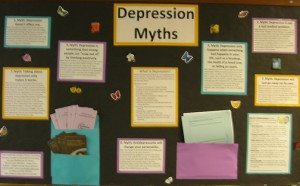The myths surrounding depression are myriad; from unrealistic beliefs about the illness’ roots to misconceptions about treatment, these myths can hamper appropriate treatment. The following article provides a reality-check regarding seven of the most common myths about depression.
Seven Common Myths About Depression
 Myths #1: Everyone gets “the blues.” While it is true that sadness is a nearly universal emotion, depression is more than just feeling sad or down. Feelings of sadness, despair, or hopelessness that last for more than one week and that occur in the absence of grief or upheaval in one’s life are more than just “the blues.” They likely indicate clinical depression, a very real illness stemming from chemical imbalances within the brain.
Myths #1: Everyone gets “the blues.” While it is true that sadness is a nearly universal emotion, depression is more than just feeling sad or down. Feelings of sadness, despair, or hopelessness that last for more than one week and that occur in the absence of grief or upheaval in one’s life are more than just “the blues.” They likely indicate clinical depression, a very real illness stemming from chemical imbalances within the brain.
Myths #2: Being depressed is a flaw of one’s personality, or it means that a person is weak. Even the strongest, most vibrant people can succumb to depression, and many suffer silently due to fear of being judged as weak or flawed. Depression is not a matter of personality, nor does it indicate a lack of strength or willpower.
Myths #3: Depression and psychosis are the same thing. The vast majority of people suffering from clinical depression are not delusional, nor do they experience a break from reality, as is typically seen in those experiencing psychosis. While psychotic depression is a real disorder, it is not at all what the average person with depression experiences.
Myths #4: Being depressed means one is just stressed out. While stress can certainly exacerbate episodes of depression, not all depression is stress-related. Many people have tried in vain to eliminate stress from their lives, only to find that they remain depressed. Because depression stems from problems within the brain’s chemistry, stress reduction alone is not enough to “cure” the disease.
Myths #5: Depression goes away on its own, eventually. For some people, this may be true, but for most, treating depression requires professional help. Therapy, counseling, and medications can not only shorten the duration of depressive episodes, but they can prevent future episodes and provide valuable coping skills. No one should feel that he or she must “tough it out” or “suck it up,” when there are so many forms of treatment that can provide relief sooner.
Myths #6: If a family member is depressed, other family members will be, too. Genetics and heredity do play a role in the development of some mental illness, but having a family member with depression is not a guarantee that it will develop.
Myths #7: People with depression are fragile and must be shielded. Some well-meaning friends and family members withhold potentially stressful information from those suffering from depression. Others may unintentionally leave a depressed person out of social events, fearing that they won’t want to participate or will be overwhelmed. Shielding those with depression from life’s joys and sorrows is likely to make the person feel burdensome, lonely, weak or unimportant; being inclusive and treating them normally is important.
Depression is surprisingly common, and so are the myths surrounding the illness. Those suffering from depression, as well as their friends and loved ones, can use the information in this article to combat some of the most common misconceptions and raise awareness about the true nature of the disease.